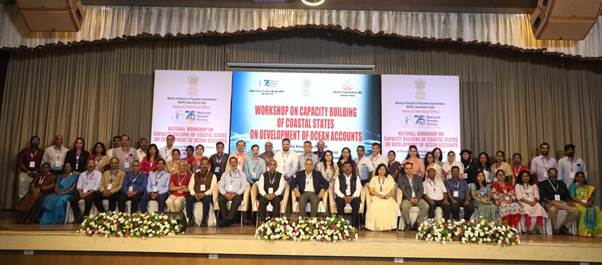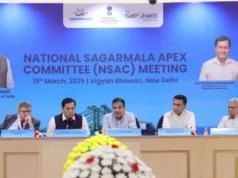The Ministry of Statistics and Programme Implementation (MoSPI), Government of India, in collaboration with the Directorate of Economics and Statistics (DES), Government of Kerala, organised a one-day workshop on “Capacity Building of Coastal States on Development of Ocean Accounts” in Kochi, Kerala on 29th August 2025. The workshop brought together officers from Ministry of Earth Sciences, Directorates of Economics and Statistics, coastal States/UTs, members of the Expert Group on Ocean Ecosystem Accounts, experts from Central Marine Fisheries Research Institute, Indian National Centre for Ocean Information Services, National Remote Sensing Centre, National Centre for Coastal Research, Centre for Marine Living Resources & Ecology, and Indian Maritime University.
Subash Chandra Malik, Additional Director General (SSD), MoSPI, underscored the workshop’s role for improving the process of compiling Ocean Accounts in line with the SEEA framework.
In his Keynote Address, N.K. Santoshi, Director General (Central Statistics), MoSPI, underscored the Ministry’s commitment to enriching India’s economic indicators by integrating Ocean Ecosystem Accounts alongside traditional measures. He highlighted how these accounts complement GDP by illuminating the dynamics of our marine resources-tracking the extent, condition, services, and assets of coastal ecosystems.
In his Inaugural Address,Dr. Saurabh Garg, Secretary, MoSPI, emphasised the urgent need to incorporate ocean ecosystem data into India’s national accounting systems, in alignment with the upcoming UN System of National Accounts (SNA-2025), which stresses accountability for natural assets like oceans, water and forests. He noted that such integration enhances transparency in GDP estimates, promotes fair distribution of ecosystem benefits, and strengthens data-driven policymaking for disaster risk reduction and sustainable development. He placed special emphasis on global initiatives:
• The Chennai High-Level Principles for Sustainable Blue Economy-adopted during India’s G-20 presidency in 2023-serve as an international framework to promote ocean conservation, resilience, and responsible economic growth based on marine resources.
• SDG 14: Life Below Water is central to the agenda, aiming to protect oceans and marine resources through sustainable management, pollution reduction, biodiversity conservation, and climate change adaptation, key for the well-being of millions and the health of the planet.
• The Blue Economy Policy of the Ministry of Earth Sciences, highlighting seven thematic areas, was referenced as a foundation for effective ocean accounts and sustainable marine planning.
Dr. Garg also commended Kerala’s Directorate of Economics and Statistics for its large and skilled workforce, urging cross-state learning and the vital role of robust statistics for India’s goal of becoming a developed nation by 2047 (Viksit Bharat). He reinforced the ministry’s support for coastal states and underlined the need for evidence-based decision-making not just in ocean accounts, but across all sectors- so that India’s development rests solidly on reliable, up-to-date data.
The workshop featured two Technical Sessions. The following expert presented their views on the concept related to ocean accounting: Anita Baghel, Deputy Director General (DDG), SSD, MoSPI gave an overview of the System of Environmental Accounting (SEEA) and Ocean Accounting frameworks and highlighted MoSPI’s initiatives and progress towards environmental accounting SEEA and Ocean Accounting in India.
Dr. Aswathy. N, Principal Scientist, Central Marine Fisheries Research Institute (CMFRI), Kochi, presented on Using Fisheries Data for Ocean Accounting Challenges and Opportunities, Evolving data and Technological advancements in fisheries data collection. Dr. Venkat Shesu Reddem, Scientist-F, Indian National Centre for Ocean Information Services (INCOIS), Hyderabad suggested for ocean condition accounts with the standardization and normalisation with other parameters of ocean ecosystem accounting. Dr. P V Nagamani, Group Head, Ocean Sciences Group, National Remote Sensing Centre (NRSC), Hyderabad, presented on Satellite Remote Sensing plays a vital role in Ocean Accounting. Remote Sensing and Geospatial Technologies together can provide more robust and effective tools / solutions for Ocean Accounts. From National Centre for Coastal Research (NCCR), Chennai Dr. U.S. Panda, Scientist-F, told that, NCCR along with world bank has prepared a preliminary Ocean Accounts for Tamil Nadu state informed that as per their estimation Ocean Natural Accounts approximately has 1% share (Rs 43000 cr) of Tamil Nadu GSDP. Dr. Smitha B.R., Scientist-E, Centre for Marine Living Resources & Ecology (CMLRE), Kochi, presented on Climate Change and Ocean Accounting: Assessing Impacts on Marine Living Resources. She mentioned that Ocean Accounting is vital to track the health of the marine ecosystems, variation in the resource potential, ecosystem services, and resilience of marine ecosystems. Dr. KVK Rama Krishna Patnaik, Faculty, Physical, Oceanography, Indian Maritime University, Visakhapatnam spoken about the innovative methods in modern Oceanography, highlighted the need for sustainable ocean development through proper data collection methods. He emphasised that the ocean energy is one of the important sector of blue economy which need immediate focus.
The day ended with the development of a roadmap aimed at strengthening institutional coordination, building state-level capacity, and creating credible, policy-relevant ocean accounts. The workshop reaffirmed MoSPI’s commitment to work closely with States/UTs, line ministries, and scientific institutions to establish a national framework of Ocean Accounts, thereby advancing India’s vision to sustainable ocean governance.




